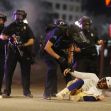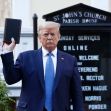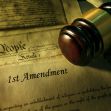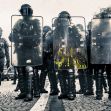Seventy-four days after George Floyd was killed by a police officer kneeling on his neck, demonstrations continue to erupt in cities across the U.S. The turbulence brings police officers, lawmakers, and protesters into conflict. What right, if any, does the government have to regulate civil dissent?
The First Amendment protects protestors. However, there are a few stipulations. First, the protest must be peaceful. Violent uprisings are always unlawful. Second, the government can control when, where, and how your demonstration takes place. What it cannot do is control your speech’s content, nor can it forbid you from making it.
In the 1989 U.S. Supreme Court case Ward v Rock Against Racism, the court affirmed that First Amendment limitations that restrict the time, place, or manner of speech are valid if they’re powered by content-neutral reasoning, serve a significant public or government interest, and leave you free to express yourself in another way. The government cannot stifle your speech, but it can force you to move your protest off the White House lawn.
PEN America, an organization dedicated to promoting human rights and free expression, reports that since 2016, states have introduced 110 bills designed to curb protesters’ rights. For example: “Thirty-six of the 116 bills PEN America analyzed have attempted to create a new, heightened criminal action for obstructing or impeding traffic on a public highway.” Blocking traffic is already outlawed in most jurisdictions. However, recent efforts are attempting to impose harsher penalties, to the concern of civil rights activists. As the American Civil Liberties Union notes, “driving isn’t a right— it’s a privilege. Protesting on the other hand, and specifically protesting in the streets, is a fundamental constitutional right.”
Several states also considered imposing criminal liability for property damage on everyone participating in a protest rather than the perpetrators themselves. These laws are problematic because your right to protest cannot be dependent on someone else’s behavior.
“One person’s decision to resort to violence does not strip other protesters of their right to freedom of peaceful assembly,” a United Nations representative explained, as quoted in the PEN America report. “This right is not a collective right; it is held by each of us individually.”
Challenges also arise over curfews. The state has the right to protect itself. Curfews are legal if they satisfy the requirements detailed in Ward. If they’re applied indiscriminately, they’re clearly content-neutral. However, the other two conditions are harder to satisfy, particularly as they relate to the press. It’s difficult to prove that the state has a compelling interest in preventing journalists from reporting the news during curfew hours. Additionally, if curfews apply to the media, it’s not clear that alternative channels for expression are provided. Who’s going to report on the enforcement of the curfew itself?
Many jurisdictions carve out press exemptions in their curfew regulations. However, this is not the case everywhere. A special analysis by The Reporters Committee shows that dozens of journalists reporting on the George Floyd protests have been arrested for violating curfew even after showing their press credentials.
President Trump has spoken about the unrest.
“But in recent days, our nation has been gripped by professional anarchists, violent mobs, arsonists, looters, criminals, rioters, Antifa, and others. A number of state and local governments have failed to take necessary action to safeguard their residents,” he said during a press conference.
“These are not acts of peaceful protest. These are acts of domestic terror. The destruction of innocent life and the spilling of innocent blood is an offense to humanity and a crime against God.”
The protests have in some instances devolved into lawless rioting. When lawmakers attempt to clamp down on protest rights, these are the instances they refer to. However, while looting, property destruction, and other violent acts can justify a state’s decision to exercise its police powers, those actions do not, or should not, erode your right to peacefully protest.






